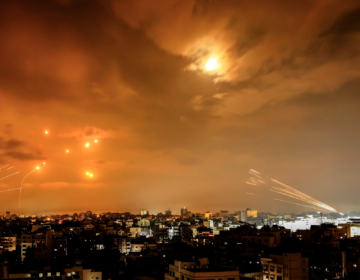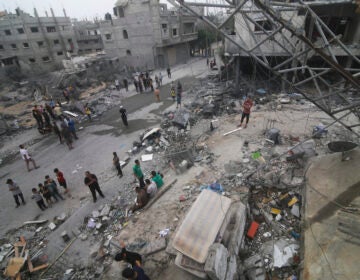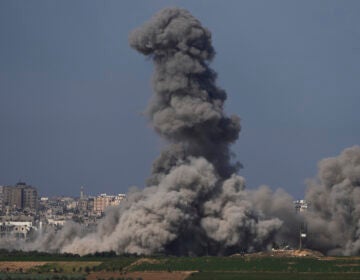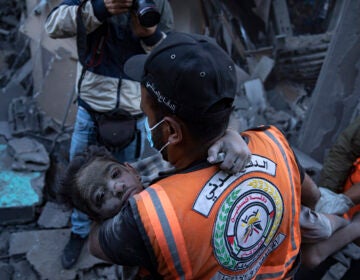Israel increases strikes on Gaza and 2 more hostages are freed. UN says aid sent so far is a trickle
With Israel still barring the entry of fuel, the U.N. said aid distribution would soon grind to a halt when it can no longer fuel trucks inside Gaza.
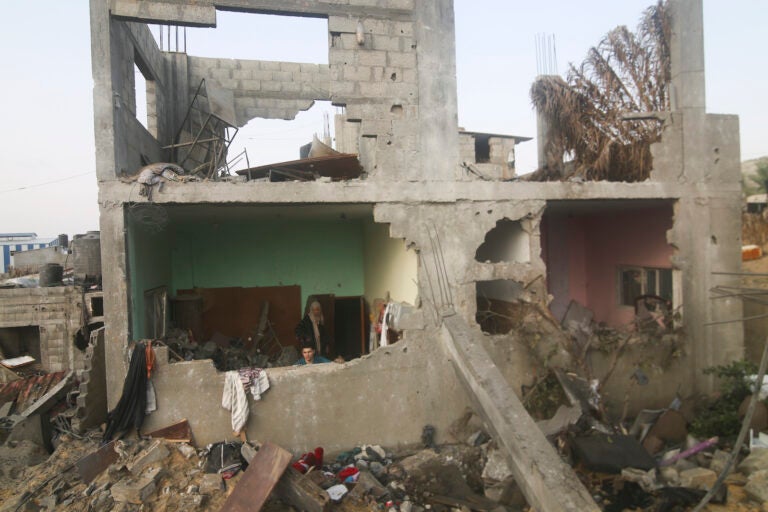
A building destroyed in the Israeli bombing of the Gaza Strip is seen in Rafah on Tuesday, Oct. 24, 2023. (AP Photo/Hatem Ali)
What you need to know
- More than 5,000 people have been killed in Gaza, and more than 1,400 have been killed in Israel. At least 222 people were taken hostage from Israel.
- Over 1 million Palestinians have fled their homes, as Israel prepares for an expected ground invasion of Gaza.
- President Biden and Philly-area leaders have largely stood behind Israel.
- Here’s why Hamas and Israel reached this moment now — and what comes next.
Israel escalated its bombardment of targets in the Gaza Strip, the military said Tuesday, ahead of an expected ground invasion against Hamas militants that the U.S. fears could spark a wider conflict in the region, including attacks on American troops.
The stepped-up attacks, and the rapidly rising death toll of thousands killed in Gaza, came as Hamas released two elderly Israeli women who were among the hundreds of hostages it captured during its devastating Oct. 7 attack on towns in southern Israel.
French President Emmanuel Macron arrived in Tel Aviv on Tuesday, meeting with the families of French citizens who were killed or held hostage before heading to talks with top Israeli officials. He told them that he came “to express our support and solidarity and share your pain” as well as to assure Israel it is “not left alone in the war against terrorism.”
In a joint news conference with Macron, Prime Minister Benjamin Netanyahu said Israel would make every effort to fight the war quickly, “but it could be a long war.”
Gaza’s 2.3 million people have been running out of food, water and medicine since Israel sealed off the territory following the attack. A third small aid convoy entered Gaza on Monday carrying only a tiny fraction of the supplies aid groups say is necessary.
Tamira Alrifai, spokesperson for the U.N. agency for Palestinian refugees, said the 54 trucks that entered Gaza over the last several days was a “trickle” compared to the 500 trucks a day that entered before the war. She said U.N. negotiators were “very, very far away” from getting an agreement to send the sustained aid into Gaza that is needed.
With Israel still barring the entry of fuel, the U.N. said aid distribution would soon grind to a halt when it can no longer fuel trucks inside Gaza. Hospitals overwhelmed by the wounded are struggling to keep generators running to power lifesaving medical equipment and incubators for premature babies.
On Tuesday, Israel said it had launched 400 airstrikes over the past day, killing Hamas commanders, hitting militants as they were preparing to launch rockets into Israel and striking command centers and a Hamas tunnel shaft. The previous day, Israel reported 320 strikes. The Palestinian official news agency, WAFA, said many of the airstrikes hit residential buildings, some of them in southern Gaza where Israel had told civilians to take shelter.
An overnight strike hit a four-story residential building in the southern city of Khan Younis, killing at least 32 people and wounding scores of others, according to survivors.
The fatalities included 13 from the Saqallah family, said Ammar al-Butta, a relative who survived the airstrike. He said there were about 100 people there, including many who had come from Gaza City, which Israel has ordered civilians to evacuate.
“They were sheltering at our home because we thought that our area would be safe. But apparently there is no safe place in Gaza,” he said.
Fifteen members of another family were among at least 33 Palestinians buried Monday in a shallow, sandy mass grave at a Gaza hospital after being killed in Israeli airstrikes.
Israel says it does not target civilians and that Hamas militants are using them as cover for their attacks. Palestinian militants have fired over 7,000 rockets at Israel since the start of the war, Israel said, and Hamas said it fired a new barrage Tuesday morning.
“We continue to attack forcefully in Gaza City and its environs, where Hamas is building up its terrorist infrastructure, where Hamas is arraying its troops,” said Israeli military spokesman Rear Adm. Daniel Hagari. He again told Palestinians to head south “for your personal safety.”
The U.N. agency for Palestinian refugees said six of its staff were killed in bombings, bringing to 35 the death toll of its workers since the war started.
The war has killed more than 5,000 Palestinians, including some 2,000 minors and around 1,100 women, the Hamas-run Health Ministry said. That includes the disputed toll from an explosion at a hospital last week. The toll has climbed rapidly in recent days, with the ministry reporting 436 additional deaths in just the last 24 hours.
The fighting has killed more than 1,400 people in Israel — mostly civilians slain during the initial Hamas attack.
On Monday night, the two freed hostages, 85-year-old Yocheved Lifshitz and 79-year-old Nurit Cooper, were taken out of Gaza at the Rafah crossing into Egypt, where they were put into ambulances. The women, along with their husbands who were not released, were snatched from their homes in the kibbutz of Nir Oz.
Appearing weak in a wheelchair and speaking softly, Lifshitz told reporters Tuesday that the militants beat her with sticks, bruising her ribs and making it hard to breathe as they kidnapped her. They drove her into Gaza, then forced her to walk several kilometers (miles) on wet ground to reach a network of tunnels that looked like a spider web, she said.
Once there, though, her treatment improved, she said. The people assigned to guard her “told us they are people who believe in the Quran and wouldn’t hurt us.” Lifshitz, whose husband remains a hostage, said conditions were kept clean, she received medical care, including medication, and was given the same one meal a day of cheese and cucumber that her captors had.
The women were freed days after an American woman and her teenage daughter were released. Hamas and other militants in Gaza are believed to have taken roughly 220 people, including an unconfirmed number of foreigners and dual citizens.
On Monday, Hamas released a video showing the handover, with militants giving drinks and snacks to the dazed but composed women, and holding their hands as they are walked to Red Cross officials. Just before the video ends, Lifshitz reaches back to shake one militant’s hand.
Around the same time, Israel’s internal security service, Shin Bet, released a recording showing Hamas prisoners — most in clean prison uniforms, but one in a bloody T-shirt and at least one wincing in pain — sitting handcuffed in drab offices talking about the Oct. 7 attack. The men said they were under orders to kill young men, and kidnap women, children and the elderly, and that they’d been promised financial rewards.
The Associated Press could not independently verify either video, and both the hostages and the prisoners could have been acting under duress.
The Israeli military later dropped leaflets in Gaza asking Palestinians to reveal information on the hostages’ whereabouts. In exchange, the military promised a reward and protection for the informant’s home.
Israel has vowed to destroy Hamas. Iranian-backed fighters around the region are warning of possible escalation, including the targeting of U.S. forces deployed in the Mideast, if a ground offensive is launched.
The U.S. has told Iranian-backed Hezbollah in Lebanon and other groups not to join the fight. Israel and Hezbollah have traded fire almost daily across the Israel-Lebanon border, and Israeli warplanes have struck targets in Syria, Lebanon and the occupied West Bank in recent days.
National Security Council spokesman John Kirby said there has been an uptick in rocket and drone attacks by Iranian-backed militias on U.S. troops in Iraq and Syria, and the U.S. was “deeply concerned about the possibility for any significant escalation” in the coming days.
He said U.S. officials were having “active conversations” with Israeli counterparts about the potential ramifications of escalated military action.
The U.S. advised Israeli officials that delaying a ground offensive would give Washington more time to work with regional mediators on the release of more hostages, according to a U.S. official, who spoke on condition of anonymity because they were not authorized to reveal sensitive negotiations.
___
Magdy reported from Cairo and Nessman from Jerusalem. Associated Press writers Wafaa Shurafa in Deir al-Balah, Gaza Strip, Aamer Madhani in Washington, Amy Teibel in Jerusalem and Brian Melley in London, contributed to this report.
WHYY is your source for fact-based, in-depth journalism and information. As a nonprofit organization, we rely on financial support from readers like you. Please give today.



